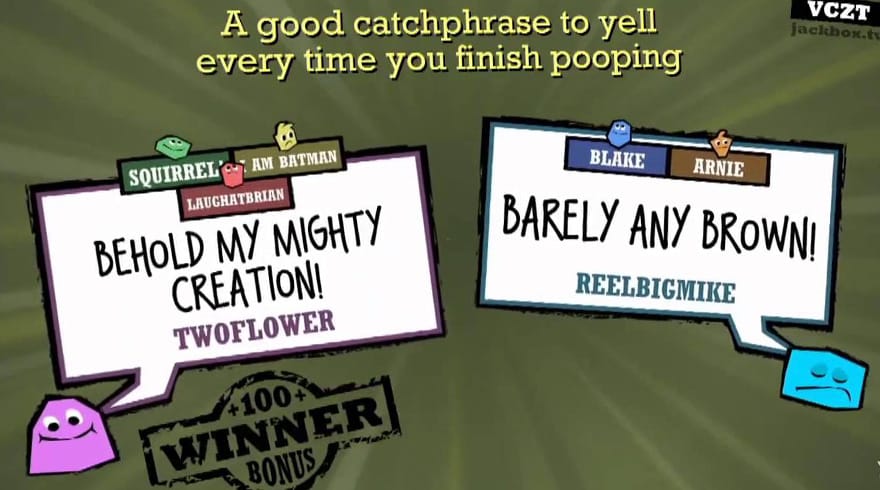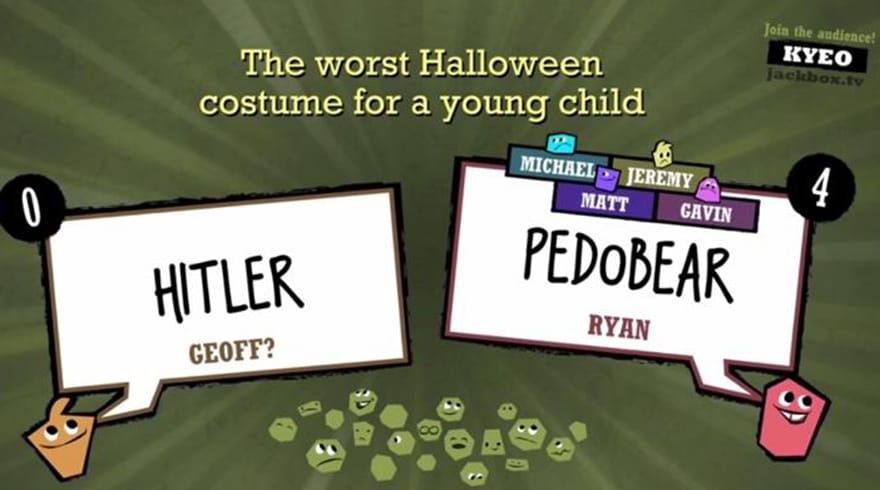Going undercover in a virtual party game

Play enough boardgames and you’ll become attuned to the hidden profiles that players bring to a party—including your own. Relatives are quick to say I’m the kind of player who not only enforces rules, but also makes up their own. I usually do the inviting and the explaining (a role I’m expected to fill even when playing for the first time), so maybe that’s how my alleged rule-making behaviour took root. While I don’t run games into the ground with strict enforcement, it’s true that I am one to follow rules and ensure others do the same. It’s a profile I carry with me, and any opportunity to shed this “identity” of sorts is something I welcome.
Ask me to define myself in accurate terms, and I’d go with “cautious tactician.” I’m the kind of player who sits on a game-changing action, card or strategy—like a Level 20 monster in Munchkin—to hold out for the right time to inflict the most damage or a power play that may never arrive. And I admit, when you play with the same groups of characters, the tactics favored from one game to the next become transparent, painting you as a steady card player. That’s why I was so eager to test out Quiplash’s premise—a party game conducted in an online setting, where profiles are exposed by your hand, not existing connection or familiarity.

What I saw in Quiplash was an opportunity to witness how party game dynamics would be influenced in a virtual space, with a setup that thrives on streamer culture and anonymity. With anonymity removing the threat of predictability, it also extends the opportunity to adopt a new face. I didn’t want to be exposed as the strict rule-follower—or the cautious tactician for that matter—so I decided to enter with a low-profile in an attempt to mask my true identity. If ever I was discovered, I could always take a scorched ground approach and join a new group where I’d be given a blank slate. And so I sought to conduct an experiment, with “Trusty” as my underground handle. I would lurk online streams and participate in games without engaging in Twitch chats, so as not to blow my cover—my true player profile. Call it playful reconnaissance.
CASE STUDY: Noah
Finding a comfortable starting point was my first obstacle, as stream after stream, it was like walking in on a late-night, uncut edition of a comedy show. Owing to the game’s open access (i.e., anyone can join using the on-screen lobby code), it’s difficult for a host to police content. Although you can shelve questions that are not family-friendly, there is no way to filter responses so as to maintain a safe space, as you might in a traditional setting. It becomes a frustrating affair when racy treatments win at questions that weren’t written to provoke such responses. For some, this will mean a welcome change from family members who lean towards mundane and literal submissions.
It was like walking in on a late-night, uncut edition of a comedy show.
During a round, players are given two questions to write answers for. Because this happens in secret, you won’t know who else has the same question, meaning that you can’t rely on estimating what the other person might say as you would in a tabletop setting. The first round (of three) acts like an icebreaker in that you can get an idea of which types of answers are being rewarded, then you can adapt future answers accordingly. For the final round, all participants get the same question and three votes (one for audience members) to either bank on a single answer or spread across multiple favourites. So if you’ve been observant to the leadings of previous rounds, you can make up for past blunders here.
My very first two questions were to come up with a new curse word, and to name a secret room in the White House. Truth be told, my answers were like those from the family members I just made fun of—bland and unimaginative—and it came as no surprise that I didn’t win in either case. In fact, as that game went on, none of my answers scored victories, condemning me to the very bottom of the leaderboard. But the more I played, the better I became at creating answers the masses would approve of.
CASE STUDY: Rynden
In one session, I was the sole audience member, and it was interesting to see the scale-tipping power this role adds. There’s a thought process of whether or not to speak to audience patterns (as revealed in the first round) or sway the core team with answers that fit the atmosphere. In several cases, my audience vote saved a player from total failure. One question asked the group to think of the best way to scare a burglar away. Of course, a “your mom” joke won, but my single vote still mattered for that one player, so it wasn’t unanimous. I was especially glad to have turned the tide in the final round, where my vote went to what I thought was a clever answer to a game-winning phrase in Jeopardy: “What is the meaning of life, Alex?” That player earned 50% of votes; others who until that point relied on jocularity came up short.
In the next game with the same group (as a participant), the streamer’s commentary added to the experience. I was satisfied with my answer to a fast food chain that only served rabbit meat, but was bummed when it didn’t earn a single point. The host, who for this particular question was barred from voting, said they would have voted for mine (“O’Hares”) in a heartbeat.
“Don’t worry, Trusty. I got your back!”
Such moments resemble what would transpire if everyone were in the same physical location. But with virtual play, such interactions are subject to how the host exercises their authority, as they instigate how sessions will play out atmospherically.
Another takeaway came from the final round, when we were given a fill-in-the-blanks question: “A perfect day is 12 hours straight of [BLANK].” Given how preceding rounds went, I fully predicted the kinds of responses my rivals would submit and won with an answer that deviated from the status quo. But there was one submission I wasn’t expecting, in which someone used flattery to secure victory. It achieved the desired result of persuading the streamer, but it was unsuccessful at gathering the bulk of votes. This element was something I would see in greater force as I jumped ship.
CASE STUDY: Laura
My next session was an intriguing stage in the experiment, as this particular streamer had an established following. For that reason, lurkers like me stood out.
“I don’t even know who half of you are!”
I felt like a wild card, and it was an exciting role to play when there was a sense of connection among the participants.
Winning at the first question was a positive foreboding—“El Cheapo” for a really cheap hotel. And as Round 1 went on, I frequently was in tune with the rest on which answer was the best of the bunch. An item not in Taylor’s purse? “A song about boyfriends.” 9-1. Really bad Broadway musical? “Spider-Man: The Musical.” 6-4. After points were tallied, I was sitting at 2nd Place. Then Round 2 came and the dynamic changed suddenly.
knowledge I armed myself with moving forward…
For a new yoga pose, someone put “The Thorny.” Not knowing the backstory, I went with the alternative—and paid the price. As it turns out, “Thorny” was the streamer’s cat. Elsewhere, I submitted “Yoda” as a Skittles flavour that didn’t make the grade, while another participant answered with “Sourpls.” Again, an inside joke prevailed.
I felt my leaderboard standing fall, and it seemed my standing with the group was plummeting at a proportionate rate. Unable to reclaim my position, I took a different approach for the final round and stole a winning answer from another stream. Not a single vote came my way, teaching me that the dynamics of a particular session are self-contained and can’t always be applied to outside scenarios. With this group, there was a lot of cat talk and inside jokes, knowledge I armed myself with moving forward … although adapting didn’t necessarily improve matters (see: “Cats are automatic royalty” losing as the first commandment for a new religion).

Succeeding rounds really cemented my place as an outsider. After seeing I came up with “Fetch the hat from the well” for a fun trick to play on the Pope, the streamer yelled out:
“Who’s Trusty? Who are you?!”
Incidentally, the host had a habit of calling me out, either to poke fun at the fact that I was a stranger (“Trusty really liked that one!”) or to urge me to identify myself in the chat, which I found inordinately hilarious.
For the final question, the group was asked who would be inducted into a hall of fame for jerk-like behaviour. Having accepted my reputation by this point, I made a risky move: “The entire chat.” Oh boy. Funny thing is, I actually got a few votes! (Probably because the streamer turned on us for saying her past would be a great topic for a million-seller book.) But the best reward came once my name was attached to the answer.
“Trusty is a mean person.”
Just when I was starting to feel at home, I said a silent goodbye to the group that brought me many laughs in their confusion over my “traitorous” role.
///
In sum, what did my undercover experiment yield in terms of findings?
1. For anonymous participants, it’s like speed dating, in that you can bounce around streams and find which room you like best based on the quality of answers. And the fact that you’re (likely) an enigma to the group allows you to tailor your tactics accordingly.
2. Being an audience member gives you a surprising amount of power for causing narrow victories, while participants must factor in audience tastes when composing answers.
3. Since authority is given to democracy as the deciding variable, and attribution only appears after voting, victories feel earned and answers are tested, not by bias or favouritism, but on their merits as standalone contributions.
4. Originality can be stifled by low-hanging fruit. It’s how an answer like “She hoards amiibo” to “Queen Elizabeth’s deepest darkest secret” can be bested by crude submissions.
5. The host can’t manifest complete control over the proceedings. In some cases, this is how the best answers unfold; in others, it’s cause for an off-putting atmosphere.
6. Regular followers will influence a game from top to bottom. When inside jokes and certain themes run the gamut of submissions, it behooves you to adapt or get left behind.
7. Questions may at times be repeated as you visit other rooms, but answers often aren’t identical. By the same token, borrowing winning answers from previous games isn’t a surefire strategy.
8. Commentary from host will often dictate the tone of the affair like a backwards funnel.
9. Choosing “Trusty” for a nickname is, ironically, cause for distrust.
Quiplash may borrow certain parameters from other party games, but it most assuredly delivers on memorable hijinks. It’s fascinating to witness how a party of strangers differs in tone and engagement from one with an established community. As well, the dynamics of power disruption tied to the audience, adapting to the current of winning answers and tonal control being in the hands of the streamer, are all interesting components to a game where tactical sands regularly shift and personal charm comes secondary to environment-conscious actions. Best of all, it’s an environment where profiles are not forever written in stone, where players with a demure disposition and players with an aggressive disposition have even odds of victory.



